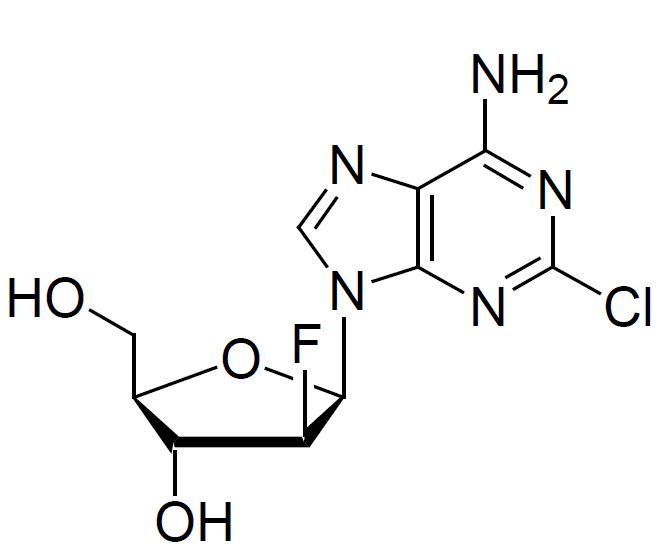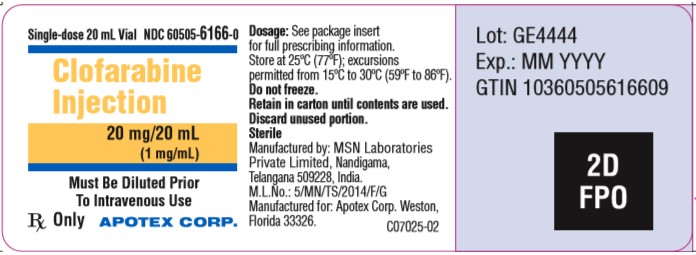Clofarabine
Generic name: clofarabine
Brand name: Clolar
Dosage form: intravenous solution (1 mg/mL)
Drug class: Antimetabolites
Medically reviewed by A Ras MD.
What is clofarabine?
Clofarabine is a prescription medicine that is used to treat a type of leukemia.
Description
Clofarabine injection contains clofarabine, a purine nucleoside metabolic inhibitor.
The chemical name of clofarabine is 2-chloro-9-(2′-deoxy-2′-fluoro-β-D-arabinofuranosyl)-9H-purine-6-amine. Its molecular formula is C10H11ClFN5O3 with a molecular weight of 303.68 Daltons.
The molecular structure of clofarabine is:

Clofarabine injection (1 mg/mL) is supplied in a 20 mL, single-dose vial. The 20 mL vial contains 20 mg clofarabine formulated in 20 mL unbuffered normal saline (comprised of Water for Injection, USP, and Sodium Chloride, USP). The pH range of the solution is 4.5 to 7.5. The solution is sterile, clear and practically colorless, and is preservative-free.
Mechanism of Action
Clofarabine is sequentially metabolized intracellularly to the 5′-monophosphate metabolite by deoxycytidine kinase and mono- and di-phospho-kinases to the active 5′-triphosphate metabolite. Clofarabine has affinity for the activating phosphorylating enzyme, deoxycytidine kinase, equal to or greater than that of the natural substrate, deoxycytidine. Clofarabine inhibits DNA synthesis by decreasing cellular deoxynucleotide triphosphate pools through an inhibitory action on ribonucleotide reductase, and by terminating DNA chain elongation and inhibiting repair through incorporation into the DNA chain by competitive inhibition of DNA polymerases.
The affinity of clofarabine triphosphate for these enzymes is similar to or greater than that of deoxyadenosine triphosphate. In preclinical models, clofarabine has demonstrated the ability to inhibit DNA repair by incorporation into the DNA chain during the repair process. Clofarabine 5′-triphosphate also disrupts the integrity of mitochondrial membrane, leading to the release of the pro-apoptotic mitochondrial proteins, cytochrome C and apoptosis-inducing factor, leading to programmed cell death.
Clofarabine is cytotoxic to rapidly proliferating and quiescent cancer cell types in vitro.
Before taking clofarabine, tell your doctor:
- If you are allergic to clofarabine; any part of this medicine; or any other drugs, foods, or substances. Tell your doctor about the allergy and what signs you had.
- If you are taking any drugs that can raise the chance of kidney problems. There are many drugs that can do this. Ask your doctor or pharmacist if you are not sure.
- If you are taking any drugs that can raise the chance of liver problems. There are many drugs that can do this. Ask your doctor or pharmacist if you are not sure.
- If you are breast-feeding. Do not breast-feed while you take clofarabine and for 2 weeks after your last dose.
This is not a list of all drugs or health problems that interact with clofarabine.
Tell your doctor and pharmacist about all of your drugs (prescription or OTC, natural products, vitamins) and health problems. You must check to make sure that it is safe for you to take clofarabine with all of your drugs and health problems. Do not start, stop, or change the dose of any drug without checking with your doctor.
What are some things I need to know or do while I take clofarabine?
- Tell all of your health care providers that you take clofarabine. This includes your doctors, nurses, pharmacists, and dentists.
- Low blood cell counts have happened with clofarabine. If blood cell counts get very low, this can lead to bleeding problems, infections, or anemia. Sometimes, these have been deadly. If you have questions, talk with the doctor.
- You may have more chance of getting an infection. Wash hands often. Stay away from people with infections, colds, or flu.
- You may bleed more easily. Be careful and avoid injury. Use a soft toothbrush and an electric razor.
- Talk with your doctor before getting any vaccines. Use of some vaccines with clofarabine may either raise the chance of an infection or make the vaccine not work as well.
- Patients with cancer who take clofarabine may be at a greater risk of getting a severe health problem called tumor lysis syndrome (TLS).This may lead to death. Call your doctor right away if you have a fast or abnormal heartbeat; any passing out; trouble passing urine; muscle weakness or cramps; upset stomach, throwing up, diarrhea, or not able to eat; or feel sluggish.
- Very bad and sometimes deadly liver problems have happened with clofarabine. Call your doctor right away if you have signs of liver problems like dark urine, feeling tired, not hungry, upset stomach or stomach pain, light-colored stools, throwing up, or yellow skin or eyes.
- Very bad and sometimes deadly bowel problems have happened with clofarabine. Most of the time, this happened within 30 days of treatment and when more than one chemo drug was used. Talk with the doctor.
- This medicine may cause the release of proteins called cytokines. This may lead to some other health problems and organ problems. Sometimes, these may be deadly. Call your doctor right away if you have a fever, fast heartbeat, fast breathing, shortness of breath, very bad dizziness, or passing out.
- If you have upset stomach, throwing up, diarrhea, or are not hungry, talk with your doctor. There may be ways to lower these side effects.
- Have blood work checked as you have been told by the doctor. Talk with the doctor.
- You will need to have heart function tests while taking clofarabine. Talk with the doctor.
- This medicine may affect fertility. This may lead to not being able to get pregnant or father a child. If this happens, it is not known if fertility will go back to normal.
- This medicine may cause harm to an unborn baby. A pregnancy test will be done before you start clofarabine to show that you are NOT pregnant.
- Women must use birth control while taking clofarabine and for some time after the last dose. Ask your doctor how long to use birth control. If you get pregnant, call your doctor right away.
- Men with a partner who may get pregnant must use birth control while taking clofarabine and for some time after the last dose. Use a condom and another form of birth control that you can trust. Ask your doctor how long to use birth control. If your partner gets pregnant, call the doctor right away.
How is clofarabine best taken?
Use clofarabine as ordered by your doctor. Read all information given to you. Follow all instructions closely.
- It is given as an infusion into a vein over a period of time.
- Other drugs may be given before clofarabine to help avoid side effects.
What do I do if I miss a dose?
- Call your doctor to find out what to do.
What are the side effects of clofarabine that I need to call my doctor about immediately?
WARNING/CAUTION: Even though it may be rare, some people may have very bad and sometimes deadly side effects when taking a drug. Tell your doctor or get medical help right away if you have any of the following signs or symptoms that may be related to a very bad side effect:
- Signs of an allergic reaction, like rash; hives; itching; red, swollen, blistered, or peeling skin with or without fever; wheezing; tightness in the chest or throat; trouble breathing, swallowing, or talking; unusual hoarseness; or swelling of the mouth, face, lips, tongue, or throat.
- Signs of infection like fever, chills, very bad sore throat, ear or sinus pain, cough, more sputum or change in color of sputum, pain with passing urine, mouth sores, or wound that will not heal.
- Signs of bleeding like throwing up or coughing up blood; vomit that looks like coffee grounds; blood in the urine; black, red, or tarry stools; bleeding from the gums; abnormal vaginal bleeding; bruises without a cause or that get bigger; or bleeding you cannot stop.
- Signs of kidney problems like unable to pass urine, change in how much urine is passed, blood in the urine, or a big weight gain.
- Signs of high or low blood pressure like very bad headache or dizziness, passing out, or change in eyesight.
- Weakness on 1 side of the body, trouble speaking or thinking, change in balance, drooping on one side of the face, or blurred eyesight.
- Feeling confused.
- Chest pain or pressure.
- Mood changes.
- Pale skin.
- Redness or irritation of the palms of hands or soles of feet.
- Swelling.
- A very bad skin reaction (Stevens-Johnson syndrome/toxic epidermal necrolysis) may happen. It can cause very bad health problems that may not go away, and sometimes death. Get medical help right away if you have signs like red, swollen, blistered, or peeling skin (with or without fever); red or irritated eyes; or sores in your mouth, throat, nose, or eyes.
What are some other side effects of clofarabine?
All drugs may cause side effects. However, many people have no side effects or only have minor side effects. Call your doctor or get medical help if any of these side effects or any other side effects bother you or do not go away:
- Feeling sleepy.
- Upset stomach or throwing up.
- Stomach pain or diarrhea.
- Not hungry.
- Flushing.
- Skin irritation.
- Headache.
- Anxiety.
- Itching.
- Feeling tired or weak.
- Back, bone, joint, or muscle pain.
- Pain in arms or legs.
- Mouth irritation or mouth sores.
- Signs of a common cold.
These are not all of the side effects that may occur. If you have questions about side effects, call your doctor. Call your doctor for medical advice about side effects.
You may report side effects to the FDA at 1-800-332-1088. You may also report side effects at https://www.fda.gov/medwatch.
If overdose is suspected:
If you think there has been an overdose, call your poison control center or get medical care right away. Be ready to tell or show what was taken, how much, and when it happened.
How do I store and/or throw out clofarabine?
- If you need to store clofarabine at home, talk with your doctor, nurse, or pharmacist about how to store it.
.
Label
Package Label – Principal Display Panel – 20 mL Single-Dose Vial
- NDC 60505-6166-0
- Clofarabine Injection
- 20 mg/20 mL (1 mg/mL)
- Must Be Diluted Prior To Intravenous Use
- Sterile
- Rx only
- Apotex Corp.

SRC: NLM .
